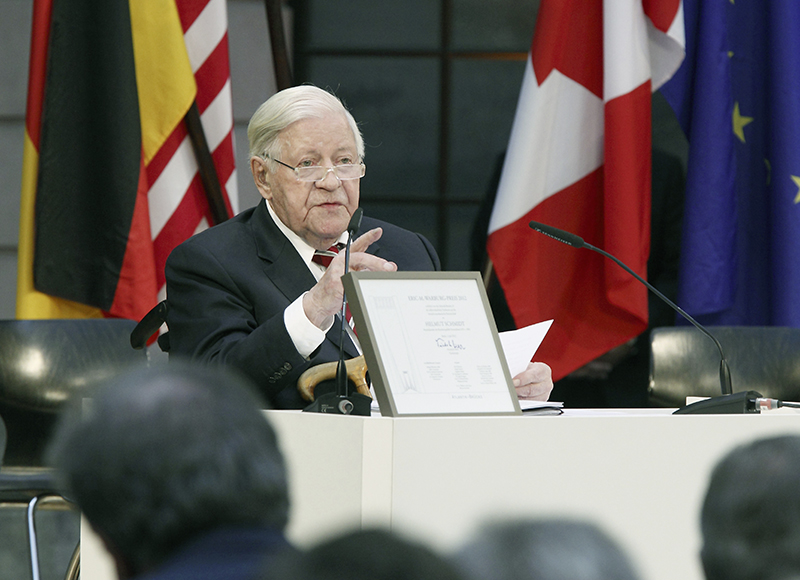Curriculum vitae
1918
Helmut Schmidt born in Hamburg on 23 December 1918 in Hamburg.

1937
- School-leaving examination at Lichtwarkschule Hamburg, enlistment in Reichsarbeitsdienst (Reich Labour Service)
- Called up for two years of military service
1939 –
1945
As an air force serviceman, Schmidt’s service included the invasion of the Soviet Union. Otherwise, his work mainly focused on postings within the home command, such as his responsibility for training at the Reich Air Ministry (with a final rank of Reserve Lieutenant)
1942
Marriage to Hannelore (Loki) Glaser in Hamburg (1944: son Walter born, but dies before his first birthday; 1947: daughter Susanne born)

1945
- Released from British captivity
- Begins studying economics and political science in the winter semester at the University of Hamburg (he graduates in 1949)
1946 –
1948
- Joins the Social Democratic Party of Germany (SPD) (1946)
- Assumes the chairmanship of German Socialist Student League (SDS)

1949 –
1953
Desk officer, later department head in the Ministry for Economics and Transport in Hamburg under Senator (and later Federal Economics and Finance Minister) Karl Schiller
1953 –
1961
- Member of German Bundestag, elected to SPD Federal Executive (1958)
- Member of several committees (incl. Transport, Economics, European Security)
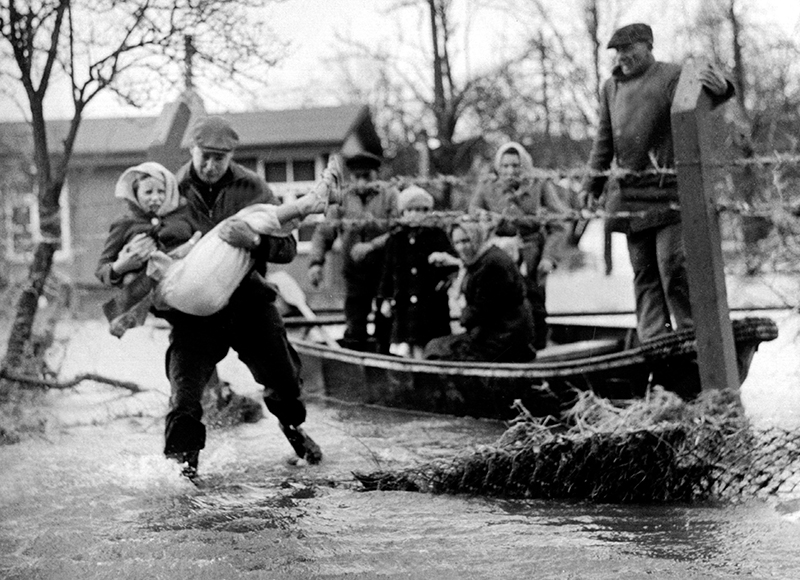
1961 –
1965
- After the SPD loses the federal election in 1961, Schmidt returns to Hamburg. Initially Police Senator, later Home Affairs Senator
- Flooding in Hamburg: by organising the rescue from flooding of thousands of people in Hamburg in February 1962, Helmut Schmidt establishes his reputation as a crisis manager
1965
Return to Bonn as Member of the Bundestag; prospective minister under the SPD’s candidate for chancellor, Willy Brandt, but the SPD again loses the election
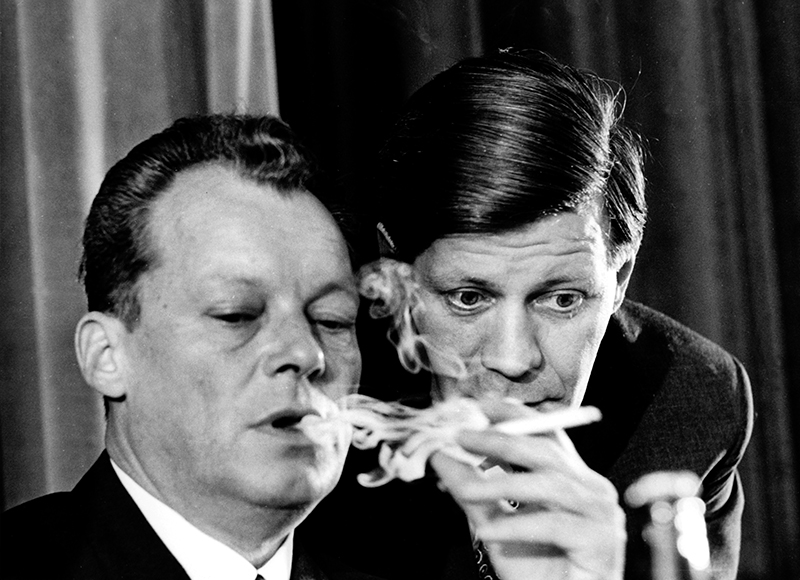
1966 –
1969
- Following the premature end to the CDU-CSU-FDP government, the first ‘Grand Coalition’ between the CDU and SPD is formed
- Schmidt takes over the chairmanship of the SPD parliamentary wing from the seriously ill Fritz Erler (1966/1967)
1968 –
1984
Deputy Chairman of the SPD
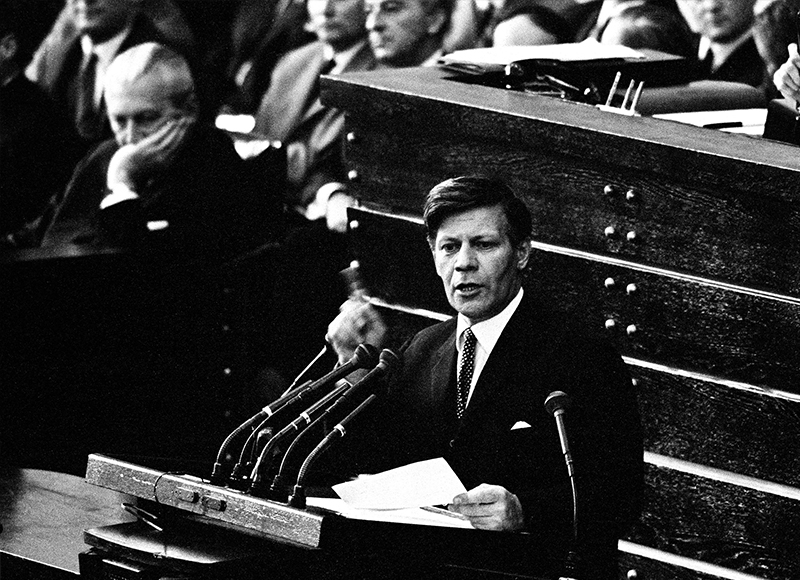
1969 –
1972
- Sworn in as Defence Minister in October as part of Willy Brandt’s first SPD-FDP cabinet
- Publishes defence policy paper “Strategie des Gleichgewichts” (Strategy of Balance) (1969)
1972 –
1974
Finance Minister in Willy Brandt’s second Cabinet (temporarily also covering the Minister for Economics’ brief)
1974 –
1975
- Elected fifth Chancellor of the Federal Republic of Germany (taking over following the resignation of Willy Brandt) (16 May 1974)
Helmut Schmidt – government statement | part 1 | mp3 | (c) Deutscher Bundestag
Helmut Schmidt – government statement | part 2 | mp3 | (c) Deutscher Bundestag
The first pages of the original speech with Schmidt’s handwritten annotations | PDF | (c) HSA
Bulletin of the new federal government
- Signs Final Act of the Conference on Security and Co-operation in Europe (CSCE) in Helsinki (1975)
- Together with the French head of state Giscard d’Estaing initiates the first World Economic Summit in Rambouillet (1975)
- Meets Chairman of the Communist Party of China Mao Zedong (1975)

1976 –
1977
- 3 October 1976: confirmed as Chancellor in federal election against CDU challenger Helmut Kohl
- Series of major demonstrations and protests in Germany against nuclear power plants and installations in Germany (Brokdorf, Gorleben etc.); federal government continues to support nuclear power
- Visit to Auschwitz/Poland (1977); Helmut Schmidt calls it one of his most difficult journeys
- During the “German Autumn” (1977) and beyond, Schmidt maintains a decisive and consistent position towards Red Army Faction (RAF) terrorists
- In the same year, Schmidt gives a highly regarded speech at International Institute for Strategic Studies in London; draft concept for establishing a strategic balance of atomic weapons in Europe

1978 –
1980
- Visit by Soviet president and party leader Leonid Brezhnev, including to Helmut and Loki Schmidt’s house in Langenhorn, Hamburg (1978); talks include nuclear disarmament
- French, British, German and US heads of government come to a preliminary agreement on the NATO double-track policy on the Caribbean island of Guadeloupe (January 1979, formal resolution by NATO member states on 12 December of that year)
- Giscard d’Estaing and Helmut Schmidt jointly implement the newly established European Monetary System (EMS) (comes into force in 1979), thereby laying the foundations for the later introduction of the euro
- Publishes “Als Christ in der politischen Entscheidung” (Political decision-making as a Christian) (1976) and “Der Kurs heißt Frieden” (Setting the course for peace) (1979)
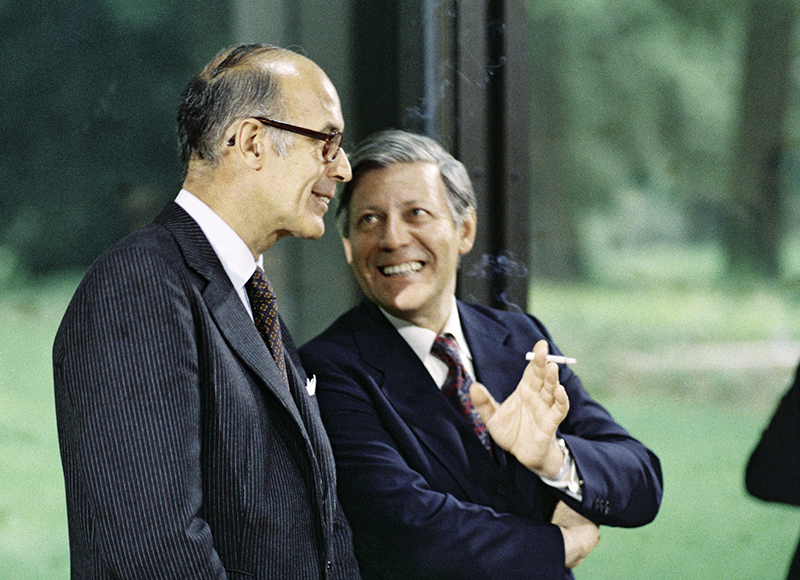
1980 –
1981
- Disarmament talks with the Soviet Communist Party leadership in Moscow and Bonn
- 5 October 1980: Helmut Schmidt wins federal election against Franz Josef Strauß (CSU) and starts his second term on 5 November 1980
- Talks with GDR head of state and party leader Erich Honecker (continuing policy of “change through rapprochement”)
- Start of a series of major peace demonstrations against nuclear rearmament in Germany (which lasts until the mid-1980s). Helmut Schmidt maintains his support for the NATO double-track decision in the face of strong public and party opposition
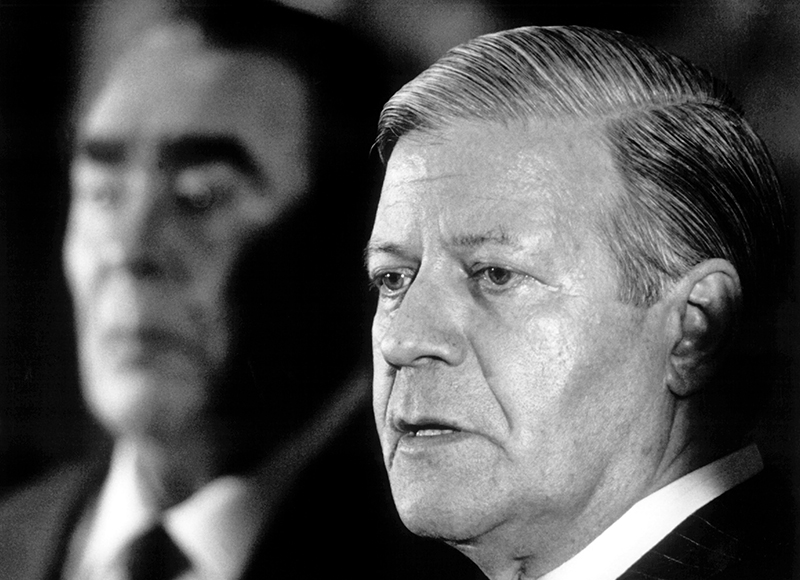
1982
- The SPD-FDP coalition collapses in late summer 1982 over economic policy differences
- 1 October: following a constructive vote of no confidence in the German Bundestag, Helmut Schmidt steps down; his successor, Helmut Kohl (CDU), establishes a CDU-CSU-FDP coalition
Helmut Schmidt in his final statement as Chancellor on 1. October 1982 in the Deutscher Bundestag | excerpt | mp3 | (c) Deutscher Bundestag

1983 –
1993
- Joint publisher (and, for a while, managing director of the publishing house) of the weekly newspaper Die Zeit; steps down from the German Bundestag (1987)
- Joint founder of the Interaction Council of former heads of government (1983), the Helmut und Loki Schmidt-Stiftung (1992) and the Deutsche Nationalstiftung (1993)

1993 –
2015
Continuation of his prolific publishing activities (“Menschen und Mächte” [“People and power”], “Allgemeine Erklärung der Menschenpflichten” [“Universal declaration of human responsibilities”], “Außer Dienst” [“Off duty”] to name but a few); many of his around 50 publications become best-sellers; Schmidt also writes hundreds of pieces for books, newspapers and magazines
Extensive international lecture tours; continued consultations on overcoming international problems and crises with politicians all over the world; recipient of numerous prizes, honorary doctorates, awards and honorary citizenships
